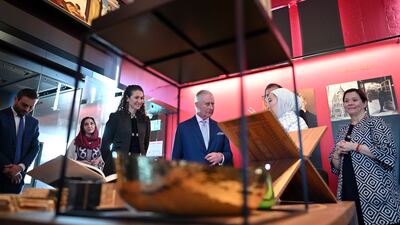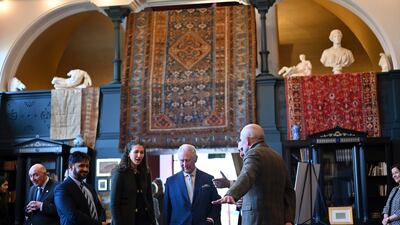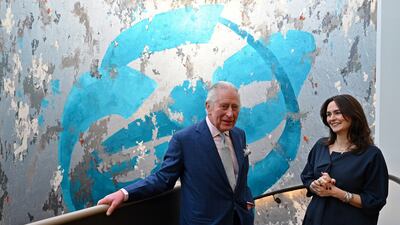King Charles III has visited the newly renovated museum Leighton House in London to hear about an artistic partnership with Turquoise Mountain, a charity he founded to preserve and develop traditional art and craft practices across the Middle East, Afghanistan and Myanmar.
The king toured the former home of Victorian artist Lord Leighton, who lavishly decorated parts of his west London home in a Middle Eastern style and with artefacts collected from his travels in the region.
While there on Thursday, he was left a little perplexed when he tried to open a puzzle box.
Parts of the building have been renovated and a new exhibition space and learning centre added. The centre has furniture commissioned from artists supported by Turquoise Mountain, an organisation founded by the king when he was Prince of Wales in 2006 to help revive historic areas around the globe and traditional craftsmanship.
When he was asked to try to open a small wooden box decorated with a geometric marquetry pattern and made by Ibrahim Khdoj, a Syrian craftsman helped by Turquoise Mountain, the king turned it in his hands and laughed as he tried to find the catch.
He was eventually shown how to prise open the lid.
The centrepiece of Leighton House is the Arab Hall, which was designed to display the Victorian artist's priceless collection of more than 1,000 medieval Islamic tiles, mostly brought back from Damascus.
The tiles were the inspiration for an 11-metre high mural, painted by Iranian artist Shahrzad Ghaffari, running the length of a large spiral staircase.
King Charles saw other works by Turquoise Mountain craftsmen and women, from jewellery and textiles to sumptuous carpets from Afghanistan.
"His majesty has been a huge supporter of artisans around the world and artisans with Turquoise Mountain and it is about creating a livelihood for people," Turquoise Mountain president Shoshana Stewart said.
"And the wonderful thing, which obviously his majesty saw before anybody, is that this is the way the world is moving and should move, which is that we want to increasingly buy a piece that means something, that comes from a particular tradition, and know about the person who made it."
Furniture in the museum was made by Syrian and Jordanian artisans based in Amman, whom the king met while visiting the Hashemite Kingdom of Jordan in 2021.
Turquoise Mountain has restored more than 150 historic buildings, trained many thousands of artisans and builders, treated more than 165,000 patients at its Kabul clinic, and supported and generated at least $17 million in sales of traditional crafts to international clients.







